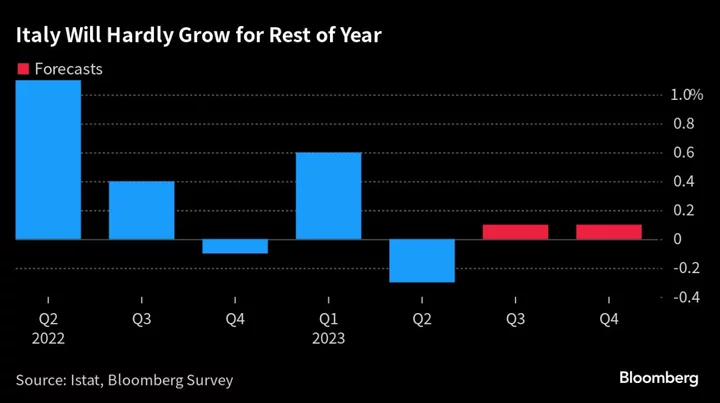Italy’s governing coalition is fighting over plans to sell state-owned assets, including the world’s oldest bank, to bolster finances stung by a souring economic outlook.
Deputy Prime Minister Antonio Tajani, who took over the business-friendly Forza Italia party after the death of its founder Silvio Berlusconi, set the tone at the annual gathering of Italy’s most influential power brokers by saying the government should accelerate its efforts to sell a controlling stake in Banca Monte dei Paschi di Siena SpA.
Tajani stirred controversy over the weekend when he told Bloomberg Television at the Ambrosetti Forum, on the shores of Lake Como, that his party backs a privatization push. That put him on a collision course with other members in Prime Minister Giorgia Meloni’s ruling coalition who’ve been critical of attempts to accelerate the sale of the embattled Siena-based lender.
Members of Deputy Premier Matteo Salvini’s anti-immigrant League party — the other junior partner in the alliance — rebutted Tajani’s statement and said the sale of Paschi shouldn’t be rushed.
It’s not the first time Meloni’s main allies have been at loggerheads. Her deputies have disagreed also on a plan to impose a 40% tax on bank profits, a move that shocked investors and disrupted markets. But until now, their internal squabbles haven’t spilled out in such public fashion.
Government officials discussed the asset-sale strategy at the Cernobbio conference, which was attended by all key ministers except the premier herself. She opted to go to the Formula 1 Grand Prix at the iconic Autodromo Nazionale di Monza, about 80 kilometers (50 miles) away. Meloni, 46, had been in talks with forum organizers about giving the final speech.
That left her finance minister, Giancarlo Giorgetti, to explain the government’s plans to chief executives and investors. Giorgetti tamped down expectations for accelerating the process of selling Monte Paschi’s assets, and said they would “solve the banking sector without anyone imposing a timing.”
Meloni’s government is considering the sale of Monte Paschi — and other selected state-owned assets — as a way to allow Italy’s far-right coalition to fund new spending without adding to the country’s mammoth debt. The move, however, could set off alarm bells with European Union regulators and in financial markets.
A disposal of assets could allow Rome to wind down its involvement in the bank earlier than an end-of-2024 deadline set by European regulators.
The proposed sales come as Italy faces worse than expected economic growth, complicating Meloni’s effort to finance her electoral pledges. The economy contracted in the second quarter, and the government is confronting the prospect that it could overshoot its deficit targets of 4.5% of GDP this year and 3.7% in 2024.
Meloni’s administration has also taken controversial moves recently to exert more control over the economy, which has made some investors nervous. In recent months Rome has announced a surprise 40% tax on bank profits, clamped down on how airlines set ticket prices, and approved a decree that will allow it to take a stake in the phone carrier Telecom Italia SpA.
Tension has been mounting between Meloni’s two coalition parties ahead of next year European elections. Forza Italia and League have become more vocal as they seek to gain consensus.
“We need less state and more companies in the economy, also to attract new investments from abroad,” Tajani said Saturday, adding that such a plan will help finance reforms, including in the fiscal and judicial areas.
Monte Paschi went through years of painful turnaround efforts after an initial bailout in 2009. Its most recent plan to revive profitability under chief executive officer Luigi Lovaglio has made the bank more appealing to investors. For years now it’s been at the focus of M&A discussion.
UniCredit’s talks with Italy’s government on a takeover of the struggling lender broke down in 2021. In recent days Banco BPM was seen by Italian media as the most likely partner for the Siena-based bank. Still, a spokesman for the Milan company said Banco BPM is pursuing a standalone strategy.
--With assistance from Alberto Brambilla, Sonia Sirletti and Daniele Lepido.
Author: Tommaso Ebhardt, Chiara Albanese and Flavia Rotondi

